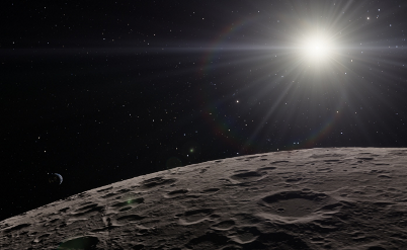Evidence about one of the oldest craters on the Moon

An international team of researchers from the UK, Canada, Sweden and Australia have provided the first sample-based evidence, which they argue reflects the age of the Serenitatis Basin – one of the oldest craters on the Moon.
The formation and ages of the lunar basins and craters, created during large collisional impact events during the first ~500 million years of the Solar System history, have fascinated scientists since the earliest observations of the Moon.
Determining accurate formation ages of impact craters on the Moon is of fundamental importance for ascribing ages to ‘un-sampled’ planetary surfaces across the inner Solar System such as those on Mars, Mercury and Venus. In addition, such large-scale impact events in the Earth-Moon system almost certainly would have influenced the environment and habitability on the Early Earth.
Previous studies have shown, however, that most of Apollo 17 rock samples were likely created in a much younger impact event, associated with the formation of the Imbrium basin. Imbrium ejecta is dispersed across much of the nearside of the Moon, which has obscured the determination of the true age of the Serenitatis Basin – indicating that it could be ~3.8 – 3.9 billion years old.
The newest findings have now provided a more accurate reflection of the Serenitatis Basin’s timeline, by studying an exceptional sample from the so called ‘Station 8 boulder’ that suggests the Serenitatis Basin was actually created 4.2 billion years ago – 300 million years earlier than initially thought.
Dr Ana Černok, who initiated this study when she was a Marie Curie Fellow at The Open University (currently an Honorary Associate), said: “We looked at this fascinating sample for a long time and tried to disentangle its complex radiogenic ages. It has been difficult to establish the exact link of the samples to the Serenitatis Basin ever since the Apollo 17 collection was brought back, because it was not easy to discern between samples formed by the Imbrium event and those formed by Serenitatis.”
Related content:
Contact our news team
For all out of hours enquiries, please telephone +44 (0)7901 515891
Contact detailsNews & articles
AI sheds new light on dinosaur footprints
A new publication introduces a transformative AI approach to studying dinosaur footprints, offering researchers (and enthusiasts!) an objective way to classify tracks and investigate the conditions in which dinosaurs lived.